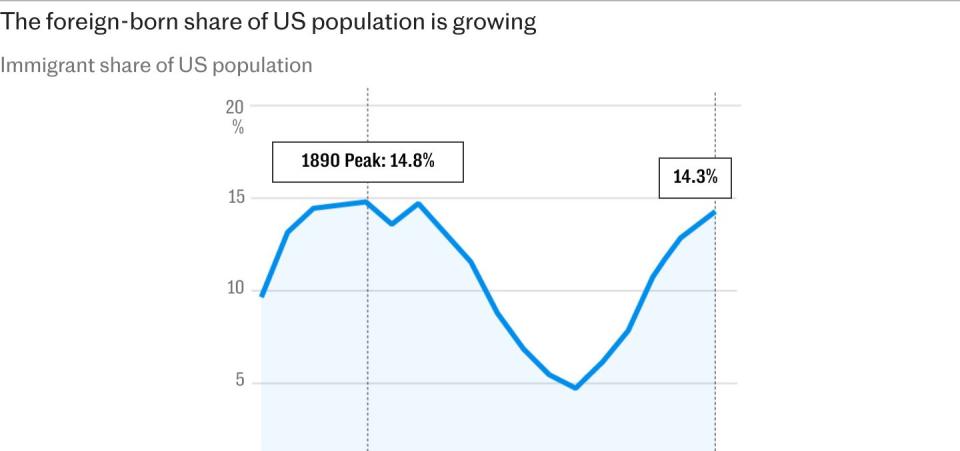Mexico border crossings into the US peaked at the end of 2023 despite TrumpŌĆÖs border fence – Brandon Bell/Getty Images
Some commentators have suggested that TrumpŌĆÖs promise of mass deportations is little more than hyperbole that will come to little fruition. However, seasoned observers believe this may be naive.
ŌĆ£It would be a miscalculation not to take him seriously and expect that he and his administration will try to undertake a mass deportation plan,ŌĆØ says Kevin Appleby, at the Center for Migration Studies.
Trump vowed after winning the election: ŌĆ£Promises made, promises kept.ŌĆØ
Plans are already being drawn up. Senators have already been told of 100 executive orders mainly on immigration that Trump will issue on his first day in office.
The president-electŌĆÖs advisers have also spent months searching for a disease to justify closing the border under emergency health powers, according to reports in The New York Times. The move would allow the government to expel migrants on public health grounds without processing asylum claims.
┬Ż400bn blow
TrumpŌĆÖs plans face two major challenges, however: logistics and economics.
Mass deportation doesnŌĆÖt come cheap. It requires infrastructure, staff and vast resources to fight the inevitable legal challenges.
The University of California has estimated the cost of the most extreme version of TrumpŌĆÖs plans where all undocumented immigrants are deported at $500bn (┬Ż400bn), or $45,000 per apprehension. The American Immigration Council separately deems a one-time mass deportation operation would cost $315bn (┬Ż256bn). It describes the figure as ŌĆ£highly conservativeŌĆØ.
The most any administration has ever managed to deport is north of 400,000 people a year under Democratic president Barack Obama.
His former homeland security secretary Janet Napolitano ŌĆō the first woman to ever hold the post ŌĆō oversaw these figures.
ŌĆ£When I was secretary during the first almost five years of Obama we deported some 450,000 people a year, and that was a high water mark,ŌĆØ she says.
ŌĆ£But that was a maximum effort focused on recent border-crossers and those with serious criminal convictions. What Trump is talking about is much broader. ItŌĆÖs anybody in the country whoŌĆÖs undocumented.ŌĆØ
Obama deported a record 1.6m people in his first term in office, followed by 1.5m during his second period in the White House. Trump removed 1.2m people.
Beating those numbers will prove challenging, Napolitano says: ŌĆ£Everybody has rights. The immigration courts are totally backed up.ŌĆØ
Then there are the logistics: ŌĆ£If you want to detain people, you have to have a bed to put them in. If you want to deport them, you have to have a country thatŌĆÖs willing to take them back. All of these things are real, and they are going to be constraints.ŌĆØ
TrumpŌĆÖs plan would involve him detaining around 13m undocumented migrants. The American Immigration Council has pointed out that this is seven times the size of the entire US prison and jail population, which stands at 1.9m people.
ŌĆ£I think if they get to half a million in their first year, theyŌĆÖll be lucky,ŌĆØ says Napolitano.
The challenges the president-elect will face extend beyond beds, meals and officers.
ŌĆ£Many of these people have lived in the country a long time. They have children who were born in this country. Then you have the whole issue of: do you deport the parents and separate them from their children?ŌĆØ
TrumpŌĆÖs border tsar Tom Homan, who also served in his last administration, is widely regarded as the architect of family separation. His zero-tolerance policy separated 4,000 children from their parents during TrumpŌĆÖs first term from 2017 to 2021.

Tom HomanŌĆÖs pledge to deport parents without their children could force US taxpayers to foot care costs – Josh Edelson /AFP via Getty Images
Homan has said he will not hesitate to remove parents even if their children born in the US cannot legally be deported.
ŌĆ£HereŌĆÖs the issue. You knew you were in the country illegally and chose to have a child. So you put your family in that position,ŌĆØ he told the Washington Post in a recent interview.
Beyond the moral questions about this policy, there is a cost to deporting parents without their children. Under the last Trump administration, immigration raids targeted 680 workers at poultry factories in Mississippi. Local schools, neighbours and family members were left to pick up the pieces when parents failed to come home from work. If this was done on a large scale, many children would be likely to end up in the care system at a cost to US taxpayers.
Napolitano was the architect of ObamaŌĆÖs ŌĆ£DreamersŌĆØ policy, which gave legal status to hundreds of thousands of people who arrived undocumented in the US as children. The Deferred Action for Childhood Arrivals (Daca) programme gives those who qualify renewable, two-year protection against deportation and makes them eligible for work permits.
The policy enabled Turay to become a prosecutor, rather than a fruit picker or roofer. But the threat of deportation hangs over him as Trump takes power.
ŌĆ£It occupies a tremendous amount of time and our lives,ŌĆØ he says. ŌĆ£We think about ŌĆśwhat if?ŌĆÖ. What is going to happen and what will our lives look like if IŌĆÖm deported? Where am I going to live? What will happen to my son? My family is going to be separated. WeŌĆÖre going to lose the mortgage.ŌĆØ
Trump closed the programme to new recipients during his first term and sought to overturn it for those already protected. At the time, Napolitano was the president of the University of California, which has a large number of Daca students.
ŌĆ£When the Trump administration tried to rescind Daca, we sued the Trump administration, and ultimately that case went to the US Supreme Court, and we prevailed,ŌĆØ she says. ŌĆ£That felt pretty good.ŌĆØ
She believes Dreamers will be on TrumpŌĆÖs hit list, but widespread public support may make them a lesser priority. The president-elect recently suggested he would protect them, but many are suspicious.
ŌĆśDepression territoryŌĆÖ
The upfront cost of mass deportations is just one part of the economic fallout. Removing millions of people from the workforce would also drive up inflation and slow growth, economists say.
ŌĆ£The fact of the matter is that the United States has lived with undocumented immigrants for a long time and some aspects of the economy are dependent on it,ŌĆØ says Napolitano, who is also a former attorney general and governor of Arizona.
Immigrants make up one in four workers in the agriculture and construction sectors. They also make up a significant share of transport, services and hospitality workers.
ŌĆ£What we see from the impact of mass deportations is a dramatic decline in US economic activity in multiple sectors,ŌĆØ Hinojosa-Ojeda, at the University of California, says. ŌĆ£Even if he deports only a million it would result in an economic downturn. Eight million is basically weŌĆÖre in depression territory.ŌĆØ
He predicts a 4pc hit to GDP and a 4.7pc blow to exports if Trump deported 8.3m workers. Imports would also fall by 1.1pc.
The pain would be shared on the other side of the southern border too. Estimates by the Pew Research Center suggest there are 4m undocumented Mexicans in the US, by far the largest group of any nationality.
ŌĆ£If you send [the Mexican migrants] back, youŌĆÖre sending them into communities where the unemployment rate is going to shoot up into 60pc to 70pc. Remittances ŌĆō the money that is sent back ŌĆō will dry up. YouŌĆÖre going to send people back to an economic disaster zone.ŌĆØ
There are doubts about whether companies would be able to replace undocumented workers with Americans, too.
Americans are having fewer children than ever and their participation in the workforce has fallen in recent years. The US birth rate fell to a record low in 2023 of 55 births for every 1,000 women aged 15 to 44. Meanwhile, many older workers retired early after the pandemic as property prices and stock markets led to a wealth boom.
Foreign-born workers now make up around a fifth of the US workforce ŌĆō up by around two percentage points from before Covid. Deportations would leave employers fighting for a dwindling supply of workers to do jobs they have shunned for decades.

Hinojosa-Ojeda says: ŌĆ£WhoŌĆÖs going to rebuild all of these houses that just got burned in LA? Guess what? You canŌĆÖt do that without Mexicans.ŌĆØ
Policymakers believe the high inflation of the last few years, which has hurt the working classes most, has helped fuel the rise in anti-immigration sentiment.
For white men without a college education who endorsed Trump, mass deportations could help boost wages ŌĆō though the cost for the wider economy would feature high inflation and more expensive mortgages.
ŌĆ£Your Amazon delivery is going to arrive later than otherwise. YouŌĆÖre going to pay more for your restaurant meals and Starbucks and all the rest of it,ŌĆØ says Paul Mortimer-Lee, a US-based fellow at the National Institute of Economic and Social Research.
ŌĆ£EveryoneŌĆÖs real incomes will be lower [because of higher inflation] and people lose because interest rates will be higher.ŌĆØ
BidenŌĆÖs share of the blame
For Trump and his supporters, immigration is about far more than economics. The president-elect and his allies have repeatedly argued that mass deportations are needed to protect national security.
Republicans have highlighted the death of Rachel Morin as an example of the risks. The 37-year-old was raped and beaten during a hiking trip in August 2023. The suspect, according to officials, was a man illegally in the US after killing a woman in his home country El Salvador.
Her mother, Patty Morin, recently told a Senate hearing: ŌĆ£The American people should not feel afraid to live in their own homes. We need to close our borders.ŌĆØ
Trump also claimed on the campaign trail that jihadi terrorists were pouring across the southern border. He recently falsely insisted the New Orleans attacker had entered the US this way. The man who killed 15 people on New YearŌĆÖs Day was in fact a US military veteran from Texas who had worked as a consultant.
Napolitano questions the effectiveness of spending hundreds of billions of dollars on mass deportations to protect national security.
ŌĆ£The way to deal with those who have suspected terrorist ties is really with close integration with the intelligence community and the sharing of information,ŌĆØ she says.
However, Biden bears some of the blame for the rise in anti-immigrant sentiment because of the ŌĆ£sheer numbersŌĆØ of arrivals under this administration, she says.
ŌĆ£When people got the perception that the border was out of control ŌĆō and I will say in the first few years of the Biden administration, they did not have control over that border ŌĆō they get afraid. Fear is a very powerful motivator in politics. The Trump campaign did a very effective job of scaring people and spreading misinformation. But people also saw what they saw.ŌĆØ
Back in Philadelphia, Turay is trying to stay calm as Trump prepares for power but admits he feels anxious. His Daca status protects him for now but if that changes, his family will lose its main breadwinner.
ŌĆ£My wife, who is a US citizen, is the caregiver to her mom who is legally disabled. She is able to do that because of my finances. My brother-in-law who is currently serving in the US Marines can do that because my wife is able to care for their mom. All because of that one undocumented immigrant.
ŌĆ£If Trump removes me, my wife will have to choose between caring for her mum and losing our mortgage. US citizens like my son will be deeply impacted not only financially but emotionally growing up without a father in his life.ŌĆØ
Turay has never left the US since he arrived in 2003. He dreams one day of having a passport and being able to travel abroad. He wants to see Liverpool play in England.
ŌĆ£As a kid, I used to tell myself, ŌĆśIŌĆÖm a good immigrant. IŌĆÖm abiding by the law. IŌĆÖm going to study really hard, get good grades and go to college. IŌĆÖm going to be an attorney. ThatŌĆÖs what America wants. They want good immigrants.ŌĆÖ
ŌĆ£Now that IŌĆÖm an adult, thatŌĆÖs not even true. They just donŌĆÖt want immigrants at all.ŌĆØ
Broaden your horizons with award-winning British journalism. Try The Telegraph free for 1 month with unlimited access to our award-winning website, exclusive app, money-saving offers and more.
Source link : http://www.bing.com/news/apiclick.aspx?ref=FexRss&aid=&tid=6783e10d490b40daba6fcab378a10130&url=https%3A%2F%2Fnews.yahoo.com%2Fnews%2Fwhy-trump-mass-deportations-risk-060000310.html&c=16614512324188634233&mkt=en-us
Author :
Publish date : 2025-01-11 17:00:00
Copyright for syndicated content belongs to the linked Source.












